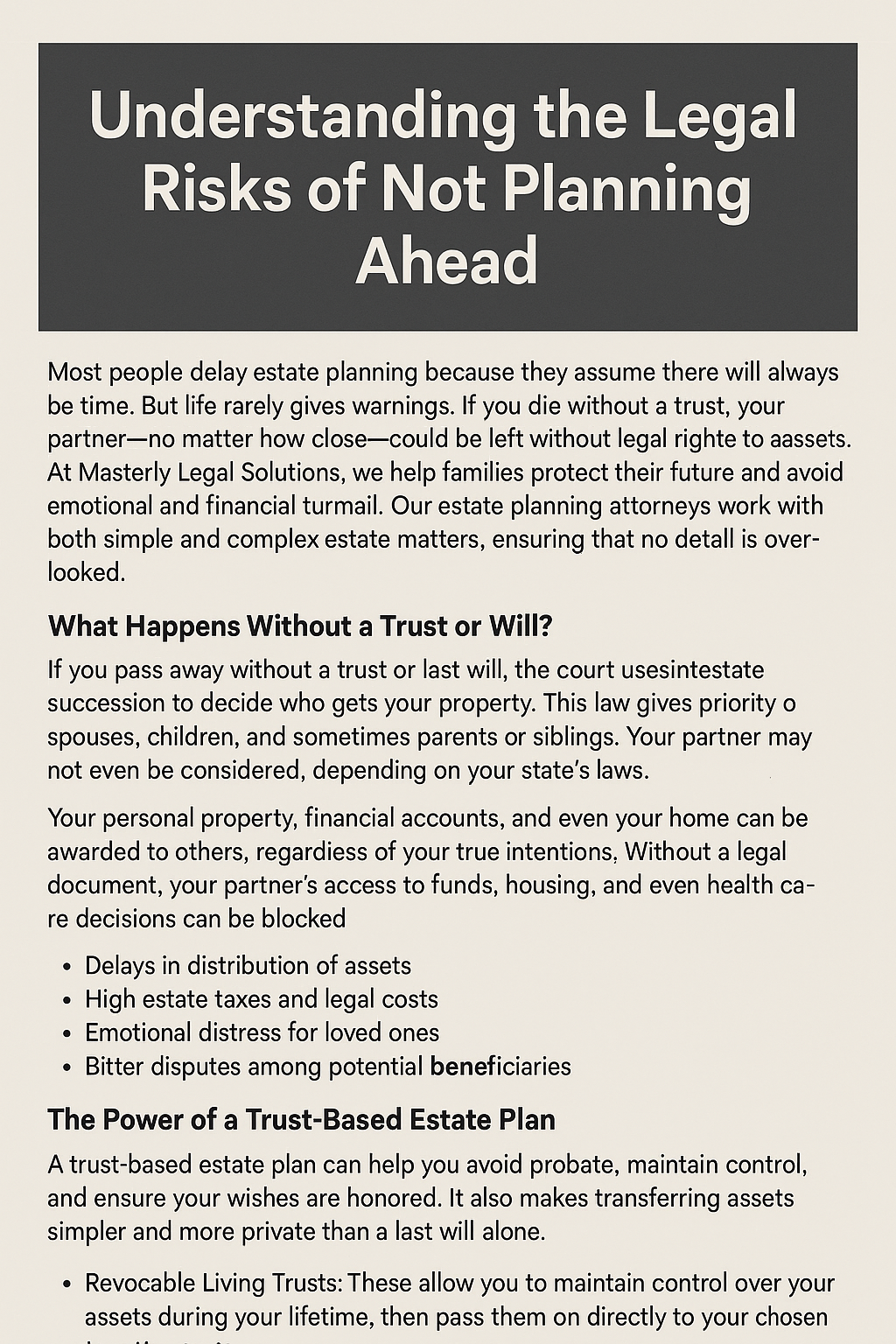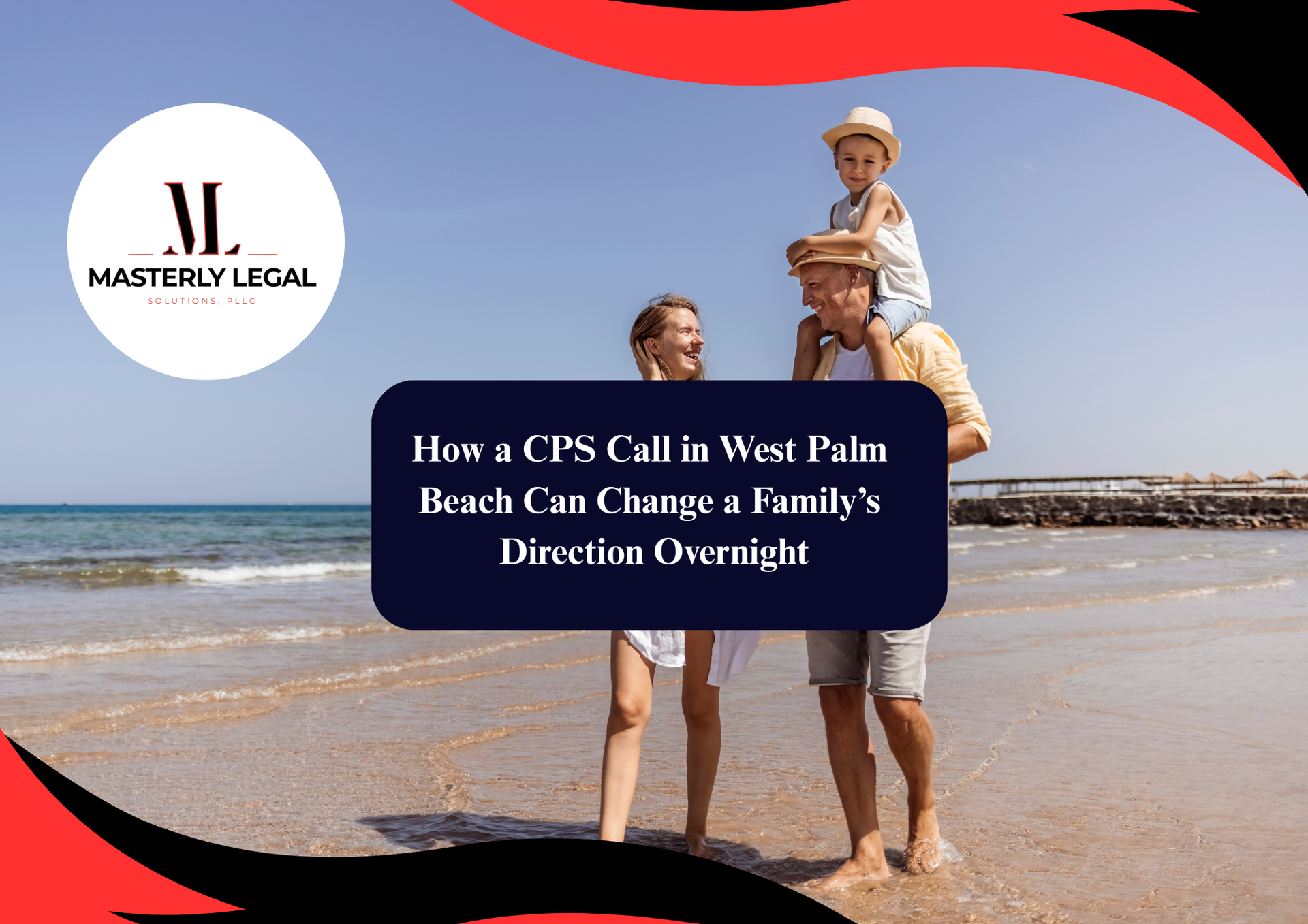Can Your Partner Access Your Assets if You Die Without a Trust?
Understanding the Legal Risks of Not Planning Ahead
Most people delay estate planning because they assume there will always be time. But life rarely gives warnings. If you die without a trust, your partner—no matter how close—could be left without legal rights to your assets. At Masterly Legal Solutions, we help families protect their future and avoid emotional and financial turmoil. Our estate planning attorneys work with both simple and complex estate matters, ensuring that no detail is overlooked.
When you fail to plan, state laws and probate courts take control. This can be especially dangerous for unmarried couples or blended families. Without the right estate planning documents, even a long-term partner may be shut out entirely.
What Happens Without a Trust or Will?
If you pass away without a trust or last will, the court uses intestate succession to decide who gets your property. This law gives priority to spouses, children, and sometimes parents or siblings. Your partner may not even be considered, depending on your state’s laws.
Your personal property, financial accounts, and even your home can be awarded to others, regardless of your true intentions. Without a legal document, your partner’s access to funds, housing, and even health care decisions can be blocked.
This process often leads to:
- Delays in distribution of assets
- High estate taxes and legal costs
- Emotional distress for loved ones
- Bitter disputes among potential beneficiaries
The Power of a Trust-Based Estate Plan
A trust based estate plan can help you avoid probate, maintain control, and ensure your wishes are honored. It also makes transferring assets simpler and more private than a last will alone.
There are two common types of trusts:
- Revocable Living Trusts: These allow you to maintain control over your assets during your lifetime, then pass them on directly to your chosen beneficiaries.
- Irrevocable Trusts: These offer powerful tax and asset protection benefits, though they cannot be changed once signed.
At Masterly Legal Solutions, we tailor every trust to fit your goals and your family structure. Our lawyers take the time to explain every option so you make informed decisions.
Married Couples vs. Unmarried Partners
While married couples gain certain rights automatically under the law, unmarried partners must plan proactively. The court does not recognize affection or commitment without documents to support those ties.
Unmarried partners can face major problems:
- No automatic inheritance of financial accounts or property
- No authority to make health care decisions
- No access to account information
- Exclusion from remaining assets after debts are paid
To prevent this, you need a proper trust, advance healthcare directive, and beneficiary designations clearly laid out.
Protecting Your Partner with Estate Planning Documents
Creating a full estate plan involves more than just a trust or last will. It includes:
- Advance healthcare directive
- Durable financial power of attorney
- Beneficiary designations on financial accounts
- Personal property memorandum
- Letter of intent or instructions
- A trust or will, depending on your goals
These documents give your partner the legal power to act on your behalf, protect your money, and fulfill your wishes in case of death or incapacity.
Why You Shouldn’t Rely on Online Estate Planning
While online estate planning may seem convenient, it often leaves serious gaps. Most platforms provide generic forms, without factoring in:
- Complex family dynamics
- State-specific law
- Taxes, assets, and ownership structure
- The interaction between multiple documents
This can result in incomplete or invalid legal documents that do not hold up in court. Worse, your partner may discover too late that they have no rights or access.
Working with experienced estate planning attorneys ensures your plan is custom-built for your situation, not a one-size-fits-all download.
Avoiding Probate and Public Record Exposure
Probate is the legal process that validates a will and distributes an estate. It is public, expensive, and time-consuming. Without a trust, your assets can be tied up for months or even years.
Worse, probate court makes your personal information a matter of public record. This means anyone can see the value of your estate, your beneficiaries, and the debts you owed.
A living trust avoids this by transferring your assets privately and efficiently, outside the court system.
Real-Life Example of the Risks
Imagine a man passes away suddenly. He and his partner shared a home and bank accounts for 15 years but never married. He never signed any estate planning documents. The house is in his name. The bank accounts are solely his. There is no legal document naming her as a beneficiary.
The result? She is forced out of the home, her access to money is frozen, and the man's estranged family inherits everything. No court sympathy, just law.
This is a story we see too often. The tragedy isn’t just the death, but the chaos left behind.
Estate Planning for All Stages of Life
It’s never too early to plan your estate. Our services are designed for:
- Young professionals just starting to build wealth
- Married couples with or without minor children
- Blended families needing to balance competing interests
- Business owners managing ownership succession
- Seniors preparing for long-term care and healthcare wishes
Our attorneys assess your full picture—your life, your property, your beneficiaries—to create a strategy that works.
The Benefits of Working with Masterly Legal Solutions
When you work with our estate planning attorneys, you receive:
- A custom trust based estate plan tailored to your needs
- Detailed guidance on all required estate planning documents
- Education on avoiding estate taxes and costly court disputes
- Help with choosing beneficiaries and naming guardians for minor children
- Planning strategies that align with your financial decisions and health care decisions
Our initial consultation helps us learn about your goals. From there, we map out your legal path forward.
Key Legal Tools to Protect Your Partner
To ensure your partner has access and authority if you pass away, we recommend:
- Signing a revocable living trust and transferring major assets into it
- Naming your partner as beneficiary on insurance and financial accounts
- Creating an advance healthcare directive and power of attorney
- Using a last will to cover any remaining assets outside the trust
These steps guarantee that your partner has legal standing, not just emotional attachment.
The Consequences of Delay
Putting off estate planning increases the risk that your loved ones will:
- Lose access to your property and money
- Be caught in lengthy and costly probate battles
- Struggle to cover your bills and final expenses
- Be overlooked completely by the court
If you care about someone, give them the gift of legal security. That starts with talking to a qualified attorney.
Our Process: From Consultation to Complete Estate Plan
Here’s how we help you through the process:
- Complimentary consultation: We answer questions about your goals and needs.
- Design meeting: We map out your trust, wills, and supporting documents.
- Draft and review: You get a chance to review every legal document before signing.
- Signing: We guide you through the final steps to ensure everything is legally binding.
- Follow-up: We help with asset transfers and beneficiary designations.
You walk away with a legally sound plan to protect your partner, your family, and your legacy.

Can Your Partner Access Your Assets if You Die Without a Trust?
Many clients mistakenly believe their partner will automatically inherit everything if they pass away without a trust. However, the truth is more complex. Without a comprehensive estate plan that includes a trust and other estate planning documents like wills, powers of attorney, and healthcare directives, your partner may face legal hurdles—especially if you aren’t legally married. A qualified lawyer for wills and trusts can help you structure your affairs to ensure your partner is protected. At our practice, we combine estate planning services with insights from family law to address the unique needs of unmarried couples. Proper legal guidance is critical to avoid probate complications and to safeguard the future of your loved ones.
What to Expect During Your Initial Consultation
Your initial consultation is the first and most important step in getting your legal affairs in order. It’s a chance to evaluate your needs, ask critical questions, and understand how a lawyer can help you with estate planning, family law matters, or other legal services. At this meeting, clients receive personalized guidance based on their financial goals, family dynamics, and long-term priorities.
1. Discovery: Learning About You
- Client Background – We discuss your family structure, dependents, and long-term goals.
- Asset Inventory – An overview of your real estate, bank accounts, retirement plans, and insurance.
- Legal Documents Review – If you have prior wills or estate documents, we evaluate them for accuracy and completeness.
- Concerns & Priorities – We listen to your worries about healthcare decisions, blended families, or minor children.
- Relationship Status – Whether married, single, or in a domestic partnership, your status affects your legal options.
2. Education: Understanding Legal Tools
- Wills vs. Trusts – We explain the pros and cons based on your estate’s size and complexity.
- Other Estate Planning Documents – Such as powers of attorney, living wills, and healthcare directives.
- Family Law Overlap – If there are divorce, custody, or guardianship concerns, we address how they intersect with estate planning.
- Tax Considerations – We explore how to structure your plan to reduce state and federal taxes.
- Probate Process Overview – Understanding how to avoid it, or how to plan for it.
3. Action: Planning Your Next Steps
- Customized Legal Strategy – We recommend tailored solutions aligned with your wishes.
- Fee Transparency – We provide a clear breakdown of service costs and legal fees.
- Timelines & Deliverables – You'll know when documents will be drafted and reviewed.
- Client Commitment – We outline what information you’ll need to provide post-consultation.
- Ongoing Support – We explain how the practice will help you update your plan as life changes.
What Is an Irrevocable Trust?
An irrevocable trust is a powerful estate planning tool used to permanently transfer assets out of your name for legal protection and long-term planning. Unlike a revocable trust, once you place assets into an irrevocable trust, you relinquish control—making it ideal for shielding wealth, minimizing estate taxes, and preserving eligibility for certain benefits. Many clients explore this option during their initial consultation as part of a broader estate planning strategy.
2 Major Benefits of an Irrevocable Trust
- Asset Protection
Assets in an irrevocable trust are generally protected from lawsuits, creditors, and divorce settlements, making it a popular tool among high-net-worth individuals and business owners. - Tax Efficiency
Because assets in the trust are no longer part of your taxable estate, irrevocable trusts can significantly reduce or eliminate estate and gift taxes, preserving more wealth for your beneficiaries.
6 Key Features to Know
- Cannot Be Modified Easily – Requires consent from beneficiaries or court approval to make changes.
- Effective Medicaid Planning Tool – Helps clients qualify for long-term care benefits without exhausting personal assets.
- Removes Ownership – Assets are no longer considered yours, which limits estate tax exposure.
- Customizable Structure – Can be tailored for life insurance, charitable giving, or special needs planning.
- Trustee Oversight – A third-party trustee manages the assets according to your instructions.
- Irrevocable Doesn’t Mean Rigid – With proper legal drafting, it can still reflect your long-term goals and protect your family’s future.
Understanding Estate Planning Services: 9 Essentials You Should Know
1. What Are Estate Planning Services?
Estate planning services involve the legal strategies and tools used to manage and distribute your assets during your life and after death. These services protect your financial legacy, reduce tax burdens, and ensure your wishes are followed.
2. Why Everyone Needs an Estate Plan
Whether you're single, married, or have children, estate planning services help avoid probate complications, prevent family disputes, and secure your health and financial decisions through documents like living wills and powers of attorney.
Core Components of Estate Planning Services (3–9)
- Last Will and Testament – Names your beneficiaries and a guardian for minor children.
- Revocable Living Trusts – Avoid probate and maintain privacy while allowing asset control.
- Durable Power of Attorney – Assigns someone to manage financial decisions if you're incapacitated.
- Healthcare Directives – Ensures your medical wishes are respected.
- Asset Protection Strategies – Shields your wealth from lawsuits and creditors.
- Beneficiary Designations – Coordinates life insurance, retirement accounts, and pensions.
- Tax Planning – Minimizes estate and inheritance taxes for your heirs.
Why You Need a Lawyer for Wills and Trusts to Protect Your Legacy
Hiring a lawyer for wills and trusts ensures your estate is properly structured, your wishes are legally enforceable, and your loved ones are protected from unnecessary court proceedings. A qualified attorney can draft a clear and valid last will and testament, establish revocable or irrevocable trusts, and coordinate your plan with other estate planning documents. While online templates may seem convenient, they often fail to address complexities like blended families, minor children, tax implications, or business ownership. Working with an experienced lawyer provides peace of mind that your legal affairs are in order and tailored to your unique life circumstances. Whether you're starting from scratch or updating existing documents, expert legal guidance is essential to building a secure, comprehensive estate plan.
Contact Us for a Complimentary Consultation
At Masterly Legal Solutions, we understand how important it is to protect the ones you love. Our team is ready to help you build a legally binding estate plan that gives your partner the rights and access they deserve.
We offer mobile services for living trusts, wills, and estate planning, so we can meet you where you are—literally and legally.
Contact us today at (972) 236-5051 for a complimentary consultation. Let us answer your questions, review your needs, and begin creating a complete plan that reflects your wishes and protects your assets.
This article is for informational purposes only and does not constitute legal advice. For legal guidance tailored to your situation, please consult an attorney.
Looking for Legal & Business Solutions? Contact Us Now
Fill in the form or call us to set up a meeting














